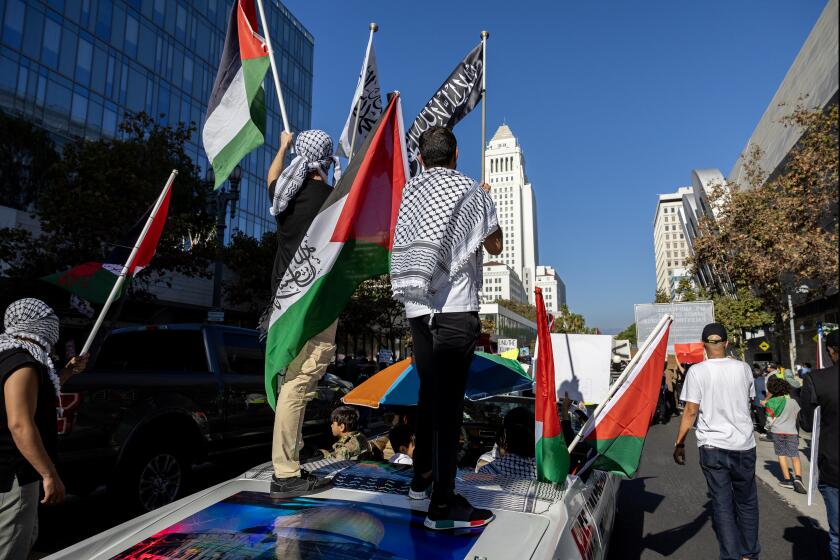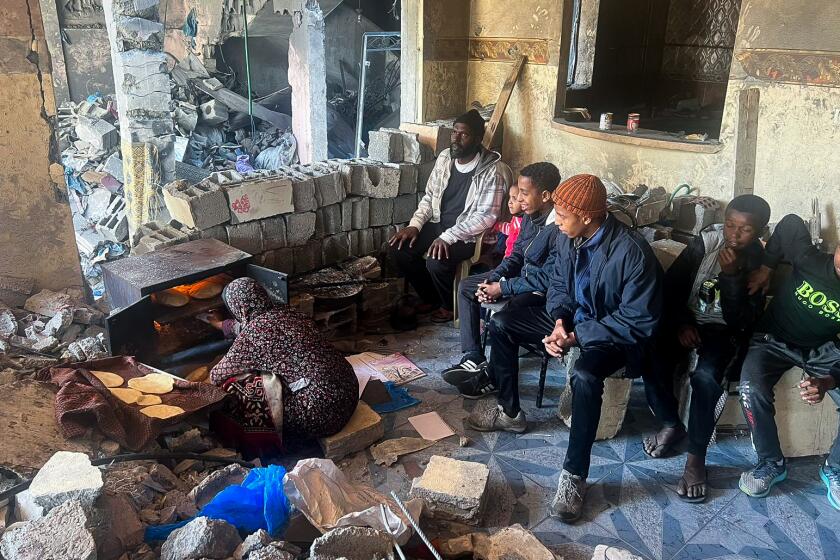U.S. engaging in high-level diplomacy to avoid vetoing U.N. resolution on Gaza aid

- Share via
UNITED NATIONS — The United States, key allies and Arab nations are engaged in high-level diplomacy in hopes of avoiding another U.S. veto of a new U.N. resolution on desperately needed aid to Gaza. The long-delayed vote, last scheduled for Thursday morning, was postponed again.
U.S. Deputy Ambassador Robert Wood told reporters as he headed into a Security Council meeting on Syria that “We’re still working it. We’re working it very hard.” He said there needed to be some changes in the text “that would make it worthy of our support.”
No new time was set for a vote, and diplomats said Russia called for closed consultations among the 15 council members Thursday afternoon.
The U.S. has been struggling to change the text’s references to a cessation of hostilities in the Israel-Hamas war, but the sticking point is the inspection of aid trucks allowed into Gaza through Israel’s blockade to ensure they are carrying only humanitarian goods. The current draft calls for the U.N. to take over the job from Israel.
Nathan Evans, the spokesman for the U.S. Mission to the United Nations, stressed that the resolution’s goal is to expand aid getting into Gaza.
“There are still serious and widespread concerns that this resolution as drafted could actually slow down delivery of humanitarian aid by directing the U.N. to create an unworkable monitoring mechanism,” Evans told the Associated Press. “We must ensure any resolution helps and doesn’t hurt the situation on the ground.”
Both the U.N. and aid groups worry that if the U.N. is placed in charge of inspections, it would delay deliveries into Gaza and may not even be possible. Israel insists it must maintain the lead on inspecting deliveries.
A council diplomat, speaking on condition of anonymity because discussions were private, said the U.S. and Egypt are engaging directly to ensure any aid monitoring mechanism can work for everyone.
In a sign of intense U.S. efforts, President Biden told reporters on his way back from Milwaukee late Wednesday afternoon that “we’re negotiating right now at the U.N. the contours of a resolution that we may be able to agree to.”
Ambassador Lana Nusseibeh of the United Arab Emirates, which sponsored the Arab-backed resolution, said earlier that high-level discussions are underway to try to reach agreement on a text that can be adopted.
For a Thai farmworker taken hostage by Hamas militants Oct. 7, memories of Israel and Gaza are of love, grief and heartbreak for those she left behind.
“Everyone wants to see a resolution that has impact and that is implementable on the ground,” she told reporters after the 15 council members held closed consultations early Wednesday afternoon and agreed to the delay. “We believe today, giving a little bit of space for additional diplomacy, could yield positive results.”
The vote — initially postponed from Monday and then pushed back to Tuesday and then Wednesday — is now expected Thursday morning, said Ecuador’s U.N. Ambassador José Javier De La Gasca López-Domínguez, the current Security Council president.
U.S. Secretary of State Antony J. Blinken spoke to the foreign ministers of Egypt and UAE late Wednesday, according to a U.S. official, but the results of the call were unclear.
In Bethlehem, the West Bank town revered as Jesus’ birthplace, Christmas is all but canceled, in solidarity with Palestinians’ suffering in Gaza.
As part of the U.S. push at the U.N., Blinken spoke Wednesday with the foreign ministers of France, Germany and the United Kingdom and stressed the need for urgent humanitarian aid to Gaza, “the imperative of minimizing civilian casualties,” and preventing further escalation of the conflict and “underscored the U.S. commitment to the establishment of an independent Palestinian state,” State Department spokesman Matthew Miller said.
Nusseibeh said the UAE is optimistic, but if the negotiations yield no results by Thursday “then we will assess in the council to proceed ... to a vote on the resolution.” The vote was first scheduled for Monday.
U.N. Secretary-General António Guterres has said Gaza faces “a humanitarian catastrophe” and that a total collapse of the humanitarian support system would lead to “a complete breakdown of public order and increased pressure for mass displacement into Egypt.”
The Palestinian cause has never had so much support. But some Palestinian Americans say the movement has a messaging problem.
According to a report released Thursday by 23 U.N and humanitarian agencies, Gaza’s entire 2.2 million population is in a food crisis or worse and 576,600 are at the “catastrophic” starvation level. With supplies to Gaza cut off except for a small trickle, the U.N. World Food Program has said 90% of the population is regularly going without food for a full day.
Israel’s bombardment and ground attacks have killed nearly 20,000 Palestinians, according to the Gaza Health Ministry, since the latest war started. During a Oct. 7 cross-border attack, Hamas militants killed about 1,200 people in Israel and took about 240 hostages back to Gaza.
Hamas controls the Gaza Strip, and its Health Ministry does not differentiate between civilian and combatant deaths. Thousands more Palestinians lie buried under the rubble of Gaza, the U.N. estimates.
The resolution draft on the table Monday morning called for an “urgent and sustainable cessation of hostilities,” but this language was watered down in a new version that was to be put to a vote Wednesday. It would call “for the urgent suspension of hostilities to allow safe and unhindered humanitarian access, and for urgent steps towards a sustainable cessation of hostilities.”
‘I just don’t know where we’ll go.’ It’s a question Palestinians ask over and over in Gaza as Israel ramps up bombardment after Hamas truce collapsed.
That draft also calls for Guterres to quickly establish a mechanism for exclusive U.N. monitoring of aid deliveries to Gaza — bypassing the current Israeli inspection of aid entering the strip.
Mercy Corps Vice-President Kate Phillips-Barrasso said a resolution calling for a suspension of hostilities is critical to delivering aid to starving people.
“We urge that an exclusive, independent mechanism be part of that agreement both in principle and in practice,” she said. “As in other conflicts, independent monitoring mechanisms are critical to ensuring aid gets to people quickly and does not involve parties to the conflict determining what gets in and how fast.”
U.S. National Security Council spokesman John Kirby also raised two other issues Wednesday morning that are not in the Arab-sponsored resolution — condemnation of Hamas’ deadly Oct. 7 incursion into southern Israel that sparked the latest war and Israel’s right to self-defense.
The U.S. on Dec. 8 vetoed a Security Council resolution, backed by almost all other council members and dozens of other nations, demanding an immediate humanitarian cease-fire in Gaza. The 193-member General Assembly overwhelmingly approved a similar resolution on Dec. 12 by a vote of 153-10, with 23 abstentions.
In its first unified action Nov. 15, with the U.S. abstaining, the Security Council adopted a resolution calling for “urgent and extended humanitarian pauses” in the fighting, unhindered aid deliveries to civilians and the unconditional release of all hostages.
Security Council resolutions are important because they are legally binding, but in practice many parties choose to ignore the council’s requests for action. General Assembly resolutions are not legally binding, though they are a significant barometer of world opinion.
Associated Press writers Aamer Madhani, Matthew Lee and Ellen Knickmeyer contributed to this report.
More to Read
Sign up for Essential California
The most important California stories and recommendations in your inbox every morning.
You may occasionally receive promotional content from the Los Angeles Times.

















